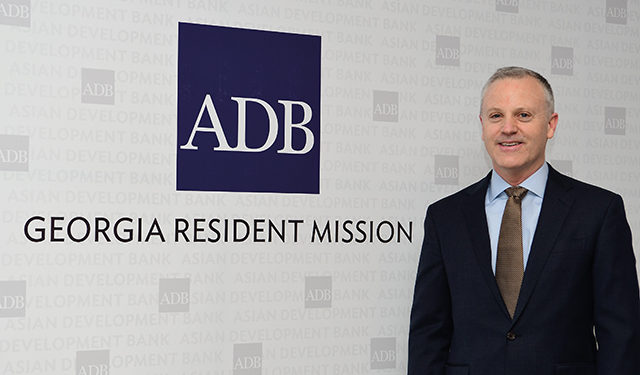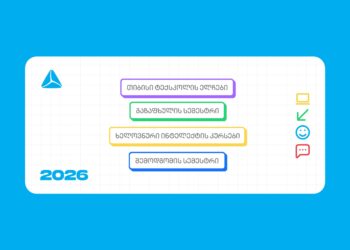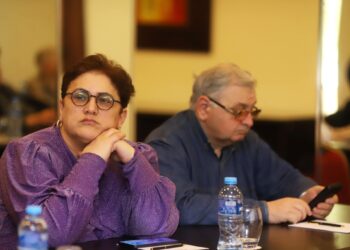Georgia is a world class tourist destination and a natural transit hub
Asian Development Bank (ADB) has been a major development partner to Georgia since 2007, providing financial assistance in the form of loans, grants, technical assistance and policy advice. The initial years were difficult ones for Georgia, coinciding with the global financial crisis and an armed conflict with the Russian Federation. One of ADB’s first sovereign loans to Georgia was for Emergency Assistance for Post-Conflict Recovery.
During the 2010s, ADB’s lending increased substantially with financing for domestic resource mobilization and one-in-a-generation investments in modernized road and energy infrastructure as well as water supply and sanitation. The goal was to help Georgia increase productivity by tackling important bottlenecks in transportation, reliable energy, and urban services. Georgia grew rapidly during this time, establishing its reputation as a reformer and ramping up the technical, procurement and safeguards expertise needed to implement major infrastructure projects.
“ADB’s assistance played an important role, and today we consider Georgia one of our most capable clients in project implementation,” says Shane Rosenthal, ADB Country Director in Georgia. GEORGIA TODAY sat down with him to find out more.
“Over the years, we’ve increasingly targeted transformative investments and supported efforts to advance public sector management reforms,” he says. “ADB diversified its engagement and became involved in energy sector development, vocational education and health. At the same time, ADB has provided loans for Georgia’s financial institutions for improved trade facilitation and access to financing to micro, small and medium-sized enterprises.
“Our current strategy for Georgia is focused on trade expansion, job creation, and combating poverty. Georgia is a world class tourist destination and a natural transit hub, and much of the work we do here is supporting the development of modern economic corridors with livable cities and a skilled workforce. Ensuring this leads to green, inclusive, and resilient growth is a topic priority.
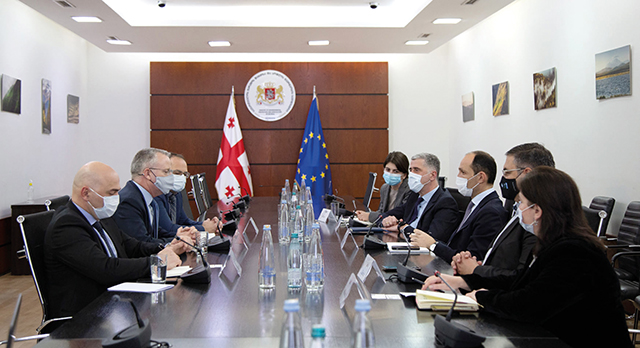
“To date, ADB has committed over $3.9 billion in assistance overall, $383 million of which is directly to the private sector,” Rosenthal notes. “ADB’s cumulative grant and technical assistance projects total $28.9 million. Our current sovereign loan portfolio amounts to $1.9 billion, with more than half of that in transportation and road infrastructure, and a third in urban and water infrastructure.”
How would you summarize ADB-Georgia relations/cooperation in 2021? What were the key areas?
The past two years have been dominated by the Covid-19 pandemic and its impact on the economy and the lives of so many Georgians. But at the same time, we’ve seen impressive resolve to continue progress on major infrastructure projects, and commitment to carry on with reforms aimed at strengthening state-owned enterprises.
ADB’s highest priority has been to support Georgia’s response to the Covid-19 pandemic. Last year, ADB provided $300 million of financing to help the government reach vulnerable groups and ensure macroeconomic stability. With help from the Government of Japan, we also extended a $2.5 million grant for medical supplies and equipment. In September 2021, ADB approved a $15 million loan to help procure and deploy vaccines. This built on ADB’s earlier technical assistance for the formulation of the National Vaccines Deployment Plan.
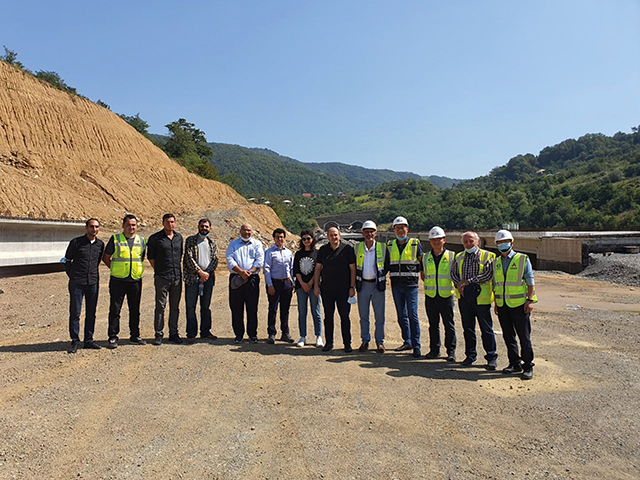
With an eye on the future, we’ve also been working with the government to prepare new projects that support balanced and inclusive growth, as well as economic stimulus during the period of recovery. This includes the Livable Cities Investment Project for Balanced Development, which is upgrading infrastructure and enhancing services for more economic opportunities: Kindergartens and sports complexes, upgraded facilities in Telavi, Mestia and other top tourist destinations, and restored parks and improved transport infrastructure in Tbilisi, designed with features to make them accessible for all.
Our current strategy for Georgia is focused on trade expansion, job creation, and combating poverty
The pandemic has not diminished Georgia’s resolve to modernize institutions responsible for service delivery. This year, ADB approved a $100 million policy-based loan to support reforms in the electricity sector. Important steps were taken to strengthen the operational structure, corporate governance, and financial management of the country’s electricity transmission company (Georgian State Electrosystem). ADB is also helping the state-owned urban water utility (United Water Services Company of Georgia) to strengthen its corporate governance, financial and human resources management, while also financing improvements in priority infrastructure. To date, ADB has provided over $630 million for urban water and sanitation that has improved services for over 300,000 households.
On the private sector side, we recently signed a $10 million loan with m2 Group’s subsidiary, to develop affordable and sustainable residential housing developments in Tbilisi, with energy efficiency and accessibility features; this was ADB’s first private sector loan to a housing development project in the region. Earlier this year ADB provided $4 million in non-sovereign support to Credo Bank for MSME borrowers in the agricultural sector. This facility primarily targets low-income farm households and women-MSMEs, a group that was particularly vulnerable to the economic impact of the pandemic.

We are also proud to have supported, as a key anchor investor, the $500 railway green bond issued by JSC Georgian Railway to address an important bottleneck in a 40-kilometer mountainous region. This was the first green bond for a state-owned enterprise and a transport company in the South Caucasus, and will help increase passenger and freight capacity, raise cargo speeds, improve safety, and reduce travel times. The project helps Georgia realize its potential as a major transportation and logistics hub. These projects highlight ADB’s leading position in Georgia in the promotion of green finance.
What has ADB identified as Georgia’s ongoing priority development needs, and how is it supporting them?
ADB’s work in Georgia is fully aligned with the priorities of the government. We’re focused on improved regional connectivity, trade, tourism, and overall enhanced economic opportunities, and are also helping with key institutional and policy reforms in the energy, public sector management and finance, agriculture, education, and health sectors, all with the goal of increasing economic diversification and fiscal resilience.
Georgia’s role as a regional transportation, trade and logistics hub is being given special consideration, incorporating roads, passenger rail, and airport infrastructure to ensure balanced regional development for increased livability in population centers. Going forward, climate-resilient and gender-sensitive infrastructure investments will be prioritized, along with the modernization of irrigation systems and education, to boost rural productivity and human capital for a more inclusive recovery. Work is already underway, with support from a $70 million loan to increase access to quality vocation education and training.
Much of the work we do here is supporting the development of modern economic corridors with livable cities and a skilled workforce. Ensuring this leads to green, inclusive, and resilient growth is a topic priority
ADB has committed more than $1.3 billion to Georgia’s strategic transport corridor and secondary road projects. These investments are helping to build about 61 km of the East-West Highway, construct 23km of climate-resilient highway along the North-South Corridor, construct a 14.3km bypass road skirting the port and resort city of Batumi, and rehabilitate a 50 km secondary road to improve access for residents and tourists in the Kharagauli district.
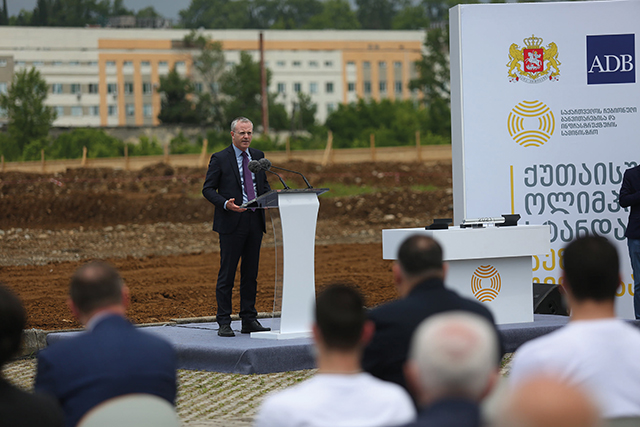
Finally, ADB is supporting a regional cooperation approach for the South Caucasus to leverage the region’s investments, promote trade facilitation, and assess new tourism opportunities through transport gateways within and beyond the region. The economic corridor development framework promotes efforts to enhance trade and competitiveness, increase bilateral trade, and strengthen economic linkages, regionally and globally.
Looking ahead to 2022, what can Georgia expect in terms of economic growth and recovery? What does it need to do to optimize the results?
Our outlook on growth is positive, but Covid-19 continues to pose risks. Georgia’s economy rebounded strongly in 2021, driven by a broad-based recovery in most sectors of the economy. Growth was underpinned by supportive macroeconomic policies and fiscal stimulus measures, which catalyzed economic activity and strengthened consumer and business confidence. Strong export growth, increased remittances, and a partial recovery of revenue from tourism strengthened the service sector and propelled real growth to double digits. Meanwhile, tourism revenue from July 2021 to date reached half of the level for the same period in 2019.
However, an increasing number of Covid-19 cases, together with a slow vaccination process, pose significant risks. The government’s vaccination campaign, which was recently boosted with pension bonuses of 200 Lari for those who receive shots, along with the introduction of the “green pass” system, can help contain a new surge in cases and make further lockdowns unnecessary. ADB is supporting the government with updates to the National Vaccine Deployment Plan to adequately respond to the latest challenges of the Covid-19 pandemic.
Exclusive Interview by Katie Ruth Davies

